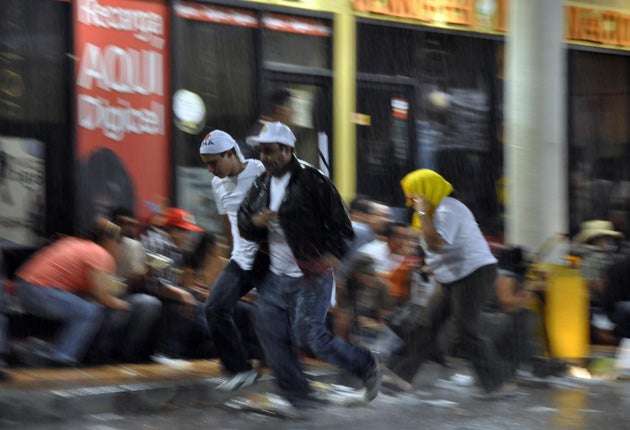Honduran army stands firm as US condemns coup
Latin America unites as riot police turn on protesters

Your support helps us to tell the story
From reproductive rights to climate change to Big Tech, The Independent is on the ground when the story is developing. Whether it's investigating the financials of Elon Musk's pro-Trump PAC or producing our latest documentary, 'The A Word', which shines a light on the American women fighting for reproductive rights, we know how important it is to parse out the facts from the messaging.
At such a critical moment in US history, we need reporters on the ground. Your donation allows us to keep sending journalists to speak to both sides of the story.
The Independent is trusted by Americans across the entire political spectrum. And unlike many other quality news outlets, we choose not to lock Americans out of our reporting and analysis with paywalls. We believe quality journalism should be available to everyone, paid for by those who can afford it.
Your support makes all the difference.The United States States stood alongside governments across Latin America voicing support for President Manuel Zelaya of Honduras one day after he was ousted and dispatched in his pyjamas to exile.
After a few hours in Costa Rica, Mr Zelaya flew late on Sunday aboard a jet provided by President Hugo Chavez of Venezuela to the Nicaraguan capital, Managua. He remained there yesterday with Mr Chavez and other leftist leaders from the region. Meanwhile, the Organisation of American States (OAS), said it would recognise no other government in Honduras but that of Mr Zelaya.
Riot police last night fired tear gas at pro-Zelaya protesters outside the presidential palace in Tegucigalpa.
While Honduras – a poor country of 7 million people that primarily exports coffee and also serves as a transit route for drugs headed for the US – faced isolation from most of the rest of the world in the wake of the President's overthrow, there was no indication that those behind the coup would be persuaded to relent.
Its leader, Roberto Micheletti, was sworn in by Congress as the "interim President" pending new elections in November. Congressional leaders, as well as the Supreme Court, said they supported President Zelaya's removal by the military, which took place a few hours before polls were due to open in a referendum on whether to limit the president's term of office – a move that would have barred him from running for re-election next year.
Mr Micheletti hit back at overseas critics of the coup, saying "nobody, not Barack Obama and much less Hugo Chavez, has any right to threaten this country".
At the White House, Mr Obama said it would be a "terrible precedent" if the coup was allowed to stand and President Zelaya was not restored to power. After talks with President Alvaro Uribe of Colombia, Mr Obama said he would work with the OAS to make that happen.
By condemning the takeover, Washington finds itself in the unfamiliar position of linking arms with the left-leaning bloc of Latin American countries that, until Sunday, counted Honduras as a member.
US Secretary of State, Hillary Clinton, said events at the weekend had "evolved into a coup". However, the US held back from calling it such as that would entail an automatic suspension of aid to Honduras.
"Much of our assistance is conditioned on the integrity of the democratic system. But if we were able to get to a ... status quo that returned to the rule of law and constitutional order within a relatively short period of time, I think that would be a good outcome," Mrs Clinton said.
However, conservative countries in the region, including the Mexican government, also moved to denounce those who ousted Mr Zelaya.
For many Latin American nations, the events in Honduras provide an unwelcome reminder of unpleasant times when military coups were nearly routine.
"We in Latin America can no longer accept someone trying to resolve his problem through the means of a coup," said Brazil's President, Luiz Inácio Lula da Silva.
Join our commenting forum
Join thought-provoking conversations, follow other Independent readers and see their replies
Comments